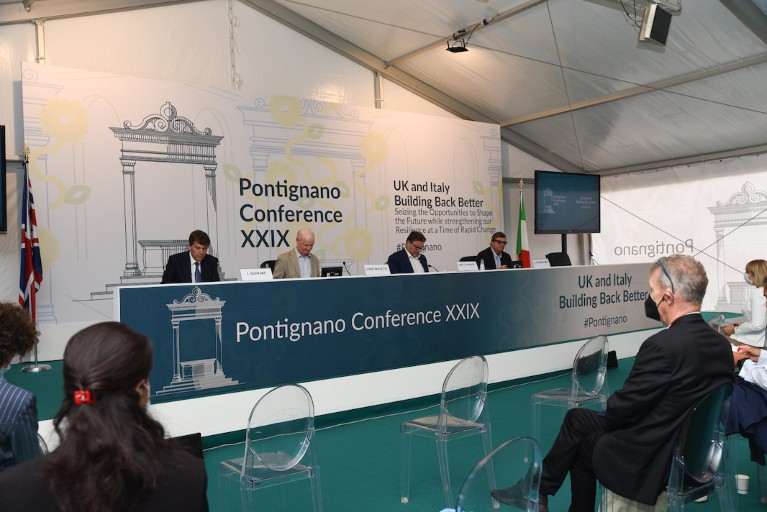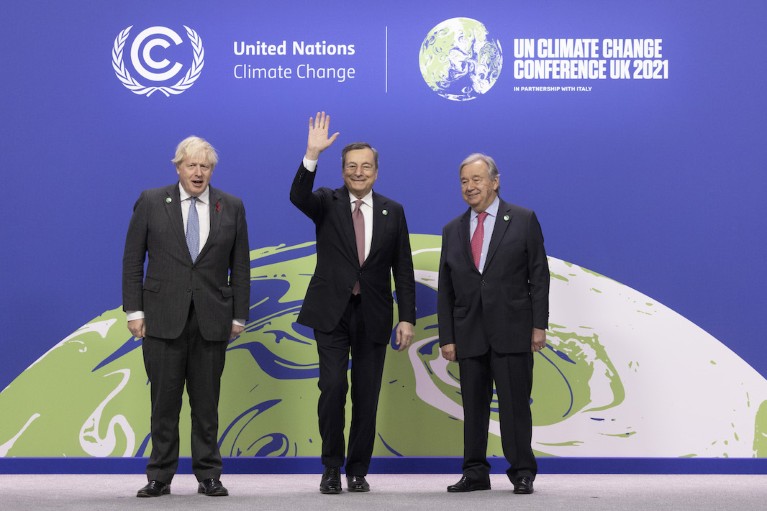
The 2021 edition of the Pontignano Conference, an annual event enforcing the UK-Italy Bilateral relationship on science policies, on 16-18 September 2021. Credit: British Embassy Rome.
With a general election looming on 25 September, Italian scientists have their own political preoccupations. They are also watching closely at what is happening in the UK, where the pending change in leadership has frozen negotiations with the EU over the Horizon Europe affiliations, until the new prime minister Liz Truss is in office.
To begin with, there are many Italians among the 150 UK-based researchers who were recently informed by the ERC office that they might lose their grants unless they relocate to mainland Europe, and some of them are considering returning to Italy to retain the award.
The 2021 Report from the Higher Education Statistics Agency (HESA), the most reliable source of information about British higher education staff, ranks Italy as the UK’s 5th research partner. Italian academic staff make up the largest foreign community in the UK science sector, and collaborate with Italian institutions. Similarly, HESA reports that Italy is among the top five destinations for UK students going abroad for a period of their education.
Brexit had already prompted an exodus of scientists from UK, and part of that outflow is heading towards Italy. Giulio Marini, a lecturer at University College London’s Social Research Institute, has tracked university staff trends in recent years. From his analyses of the most recent HESA data, it emerges that, while the number of Italian staff in UK universities increased by more than 41% in the pre-Brexit years, the growth slowed down after 2016, basically stopped from 2019/2020, and is expected to reverse in the future. According to interviews conducted by Marini, the most likely explanation is a perceived sense of hostility against Europeans and a lack of clarity over the future of the country’s scientific opportunities. “At the time of the Brexit vote, for an Italian scientist, the UK was scientifically still an attractive place”, says Andrea Perna who started his laboratory at Roehampton University in 2016. However, like many others, Perna is considering moving back to Italy or another European country. The movement of UK-based researchers to Italy also saw a 21% decline in the years after Brexit, although the pandemic contributed to that decrease.
Bilateral collaborations
To compensate for the possible loss of European funding, the British government is working through its embassies in the EU to attract European partners. Recently, the UK embassy in Rome launched the programme UK-IT BEST (Bilateral Exchange in Science and Innovation), a study aimed at mapping the current level and areas of bilateral collaboration, and the best supporting mechanisms for them. Elisa Manacorda, who coordinated the study, says that the main concern for Italian researchers are the consequences of Brexit on scientific collaborations and supplies’ mobility, as also highlighted by a Westminster report on the impact of Brexit on the custom controls. There is a general scepticism about whether the efforts to overcome the difficulties would provide the same quality of research seen in the past. “The amount of paperwork we have to fill for products coming from the UK easily puts you off”, says Louise Gourlay, associate professor in structural biology at the University of Milan, who started her career in the UK and then decided to move to Italy. The BEST study also shows that most of the bilateral collaborations involve Italians working in both countries. Over the following months, Italian and British experts will keep analysing the BEST project results and suggest ways to improve and strengthen bilateral and multilateral exchanges.

Prime Minister Boris Johnson welcomes Italian Prime Minister Mario Draghi to the COP26 summit in Glasgow, on 1 November 2021. The summit was co-organised by the UK and Italy. Credit: Simon Dawson / No 10 Downing Street (CC BY-NC-ND 2.0).
Many initiatives are in place to allow Italian science to keep its ties and exchange with the UK. In October 2017 the UK Science & Innovation Network (SIN) Italy organised the first high-level UK-Italy Research Bilateral collaboration between the Royal Society and the CNR. The two institutions then signed an Agreement on Scientific Cooperation in 2019. Since then, there are yearly calls for up to five fellowships awarded to Italian-English joint proposals. “After the Brexit vote, we have increased our efforts to make it clear that the UK government wants to continue promoting scientific collaborations with Italy, allocating funding for it”, says Laura Nuccilli, Scientific Affairs Officer for the SIN.
An uncertain horizon
The main conundrum, however, remains the UK’s participation in Horizon Europe. Just over a year ago, British scientists celebrated a deal which allowed the UK to remain a participant in the European research funding programme, worth €85 billion. However, the recent stalemate over the Northern Ireland protocol meant new delays in fulfilling the agreement, and brought the risk that UK-based researchers will not be able to keep their grants at all if staying in the British territories. In July, an editorial in Nature urged the next prime minister to make re-opening negotiations over Horizon Europe a top priority. All European scientific communities, including Italians and British scientists working in both countries, follow the question closely, says Paolo Radaelli, a professor of physics at Oxford University and member of the AISUK, the Italian association of scientists in the UK.There would be negative implications for Italian scientists, should UK leave Horizon Europe. Data from the Horizon 2020 Dashboard show that the number of Italy-led projects in which the UK is a participant almost equals the number of UK-led projects in which Italy is a participant. “Having the UK as part of the European funding competitions so far raised the level of the game and helped other EU countries [like Italy] thrive”, says David Burr, Professor of Physiological Psychology at the University of Florence.
On the other side, Italy may also benefit from this uncertainty. The European Commission has already created a “Brexit Adjustment Reserve” that allocated funding to several EU countries, with Italy only second to Ireland for the funding received. Data from the same Horizon 2020 dashboard shows Italy’s significant capacity for attracting EU funding, with 7,746 signed grants, and €5,48 bn net contributions. Should a strong competitor like the UK be out of contention, this could mean more possibilities for Italian institutions to attract funding from Horizon Europe and to lead projects.
